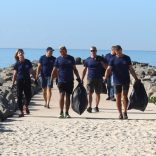Mozambique: Military solution won't solve Cabo Delgado problem - Catholic Church
Mozambique: Cabo Delgado violence caused further erosion of human rights in 2021 – HRW

File photo: VOA
The human rights situation in Mozambique deteriorated again in 2021 due to violence in Cabo Delgado, Human Rights Watch (HRW) said, also pointing the finger at the Mozambican security forces.
In the chapter dedicated to Mozambique of its annual report, released Thursday, the NGO concluded that the fighting between government forces and Islamist groups in the north of the country contributed in 2021 to the decline in human rights and the worsening of the humanitarian crisis in the region, which had already happened the previous year.
“Cabo Delgado is our biggest concern (…) and the truth is that the humanitarian issue worsened and with it came several other human rights problems”, said Zenaida Machado, the head of HRW in Mozambique, reminding that it was in 2021 that there was “one of the biggest population displacement crises”, after the March attack on Palma by the Al-Sunna wa Jama’a (ASWJ) Islamist group.
More than 800,000 people had been forced to move by September, according to the government and the United Nations High Commissioner for Refugees (UNHCR).
Some 48 per cent of the displaced are children and over 84 per cent live in temporary accommodation and host communities in the country, while 9 per cent are in refugee camps in Cabo Delgado, Niassa and Nampula provinces.
According to Zenaida Machado, it was also in 2021 – because people were able to leave the areas where they were – that HRW realised the extent of the abuses to which they had been subjected.
In 2021 the ASWJ group continued to attack villages, kill civilians, and abduct women and children, the organisation reports, recalling that Unicef warned in October that the rebels were training and indoctrinating boys to fight and that HRW itself has found evidence that the fighters are using hundreds of abducted women and girls in forced marriages or as sex slaves.
In July, the World Food Programme (WFP) warned of the risk of a food emergency due to the growing number of displaced people in northern Mozambique and given that humanitarian organisations could not reach the communities most affected by the violence.
HRW also recalled the allegations of sexual exploitation of women in exchange for humanitarian aid in several camps for displaced people in Cabo Delgado and stresses that until October the Government had not made a public commitment to investigate these allegations.
The organisation said the Government had also not taken any publicly known steps to investigate allegations of human rights violations by Mozambican security forces in anti-terrorist operations in Cabo Delgado, including intimidation, ill-treatment of displaced persons and use of illegal force against civilians.
Zenaida Machado recalled that there were reports of people prevented by the security forces from fleeing areas affected by the violence, and recalled that “many of the people who fled the insurgents’ attacks (…) denounced the absence of any assistance or protection or humanitarian aid from the Mozambican defence and security forces”.
The report condemned the agreement between the governments of Mozambique and Tanzania which allowed the repatriation of over 10,300 Mozambican asylum seekers since the beginning of the year.
These acts “violate the principle of non-refoulement, which prohibits the forced return of people to threats against their lives or freedom”.
The document referred to the increase in 2021 in the number of unsolved kidnapping cases and added that police officers were involved in at least one case.
The report recalled that several international partners, including Portugal, Rwanda, the Southern African Development Community (SADC), the United States and the European Union, have responded to the Government’s request for assistance for its military operations against ASWJ in Cabo Delgado.
“It would be unfair of us not to note positively that the support of SADC and Rwanda to the Mozambican forces has allowed security to return to some areas” and some displaced people to return to their homes, she said.
However, she regretted that the advance of the security forces into some areas had “left a gap” that allowed the insurgents to enter other areas of the country, notably Niassa province.
“Our appeal to the Mozambican authorities is that they have learnt from the experience of Mocímboa and Palma and that they are better prepared to anticipate possible crises that may come from other regions of the country,” providing protection and security for the population.
She also stressed that the authorities should respect the rights of those who are seen as suspected insurgents, who should be able to receive a fair trial.
- Read / download the full HRW WORLD REPORT 2022 HERE
Ongoing violence caused the human rights situation in Mozambique to worsen in 2021, and state security forces were implicated in an array of human rights abuses. #Rights2022 https://t.co/BMGvN19IXN pic.twitter.com/FcLt1bTpRP
— Human Rights Watch (@hrw) January 16, 2022












Leave a Reply
Be the First to Comment!
You must be logged in to post a comment.
You must be logged in to post a comment.